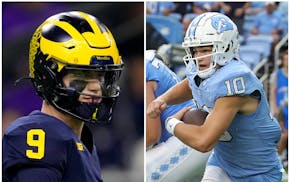One year ago this week, Vikings owners Zygi and Mark Wilf removed the interim tag from coach Leslie Frazier's title after determining, in their estimation, that he was "the best man for the job."
The owners declined to name a general manager at the same time, continuing with a model that allows Frazier and top executives to make important decisions based on open dialogue and consensus.
The time has come to scrap that organizational structure. Too much is at stake as the Vikings enter one of the most critical offseasons in their history, which doesn't even take into account their tenuous stadium situation.
The Wilfs need to hire a general manager to initiate a rebuilding project that has many tentacles. This action will require the owners to break from their normal way of operating a business. They believe in the power of collaboration.
The problem with decision-by-committee is that it fuels the perception that mistakes escape accountability, and it creates confusion over who's in charge. The Wilfs' current flow chart requires symmetry between themselves, Frazier, Rick Spielman and, at times, other executives. Maybe that works under ideal circumstances, but the Vikings are in a different place now.
They need one voice and one vision for how to fix a team that is broken. They need someone to come in -- blueprint in hand -- and say, "OK, this is how we're going to proceed. Any questions?"
The Wilfs should realize that model has worked wonders in other places. The success story of Ted Thompson in Green Bay is well-documented, the fact that he had a life-after-Favre plan and stuck with it, no matter how unpopular in some circles. Mickey Loomis built a Super Bowl champion and a dynamic offense in New Orleans.
This is not a novel idea. Others have publicly lamented the Vikings' lack of a GM. A greater sense of urgency exists now because the organization finds itself at a crossroads, amazingly in a worse spot than at the end of its 2010 soap opera season. The checklist of big-ticket issues to solve is longer than a country mile.
They must decide whether the offense should continue to revolve around Adrian Peterson, who faces a long recovery from knee surgery. Peterson no doubt will attack his rehabilitation in the same manner he does defenders, but it's fair to wonder what kind of player he will be once he returns.
And who will hand him the ball? Frazier said Christian Ponder remains the starter at quarterback, but the rookie's late-season struggles raised doubt about his status as the long-term future at that position. Joe Webb has outperformed Ponder in relief, prompting calls for an open competition this offseason.
The Vikings need a complete overhaul on defense, which could begin with coordinator Fred Pagac's removal. They also need to remake the secondary, bolster the linebacker corps and upgrade the interior of the line.
Frazier also indicated a possible change in schemes, which presumably would coincide with a new coordinator and different personnel.
All of those things must happen within the framework of reshaping the roster. They must decide what to do with a group of veterans -- Steve Hutchinson, Kevin Williams, Visanthe Shiancoe, Anthony Herrera, E.J. Henderson, Cedric Griffin -- who have meant much to the organization but might not be part of the rebuilding job.
The Vikings need to upgrade the talent. They could select as high as No. 2 overall in the draft and must be savvy with all their picks. This season's failures revealed a dearth of depth at key positions, the result of too many swing-and-misses on draft day.
The problem is, we don't know who bears ultimately responsibility. Is it Spielman, who oversees the draft as vice president of player personnel? Or former coach Brad Childress, who held final authority over the roster? Or someone else within the Triangle of Authority?
People approach personnel decisions from different perspectives. Coaches know they have a short shelf life, so they want to win now. Front-office folks tend to look at things through a longer lens. The failed Donovan McNabb experiment is a perfect example of what can happen when those two viewpoints collide.
Frazier has only two more seasons left on his contract after Sunday's finale against the Chicago Bears. He faced questions about his job security nearly on a weekly basis as the season fell apart. He can't afford to look long-term, but this rebuilding job isn't a quick fix. All the meetings in the world won't change that.
Teamwork and cooperation aren't bad things. And coaches and top executives absolutely should have input on decisions. In the end, though, everyone needs a boss.
Chip Scoggins • ascoggins@startribune.com

Scoggins: Finch feeling heat of the Suns as playoff battle looms
Scoggins: Why 'championship or bust' fits these Wolves

Scoggins: Anatomy of a game-saving play as Correa throws out Ohtani


